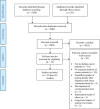Communication about genetic testing with breast and ovarian cancer patients: a scoping review
- PMID: 30573802
- PMCID: PMC6460583
- DOI: 10.1038/s41431-018-0310-4
Communication about genetic testing with breast and ovarian cancer patients: a scoping review
Abstract
Genetic testing of patients with cancer is increasingly offered to guide management, resulting in a growing need for oncology health professionals to communicate genetics information and facilitate informed decision-making in a short time frame. This scoping review aimed to map and synthesise what is known about health professionals' communication about genetic testing for hereditary breast and ovarian cancer with cancer patients. Four databases were systematically searched using a recognised scoping review method. Areas and types of research were mapped and a narrative synthesis of the findings was undertaken. Twenty-nine papers from 25 studies were included. Studies were identified about (i) information needs, (ii) process and content of genetic counselling, (iii) cognitive and emotional impact, including risk perception and recall, understanding and interpretation of genetic test results, and anxiety and distress, (iv) patients' experiences, (v) communication shortly after diagnosis and (vi) alternatives to face-to-face genetic counselling. Patients' need for cancer-focused, personalised information is not always met by genetic counselling. Genetic counselling tends to focus on biomedical information at the expense of psychological support. For most patients, knowledge is increased and anxiety is not raised by pre-test communication. However, some patients experience anxiety and distress when results are disclosed, particularly those tested shortly after diagnosis who are unprepared or unsupported. For many patients, pre-test communication by methods other than face-to-face genetic counselling is acceptable. Research is needed to identify patients who may benefit from genetic counselling and support and to investigate communication about hereditary breast and ovarian cancer by oncology health professionals.
Conflict of interest statement
The authors declare that they have no conflict of interest.
References
-
- Tay LH, Hegney DG, DNurs EA. A systematic review on the factors affecting effective communication between registered nurses and oncology adult patients in an inpatient setting. JBI Libr Syst Rev. 2010;8:869–916. - PubMed
Publication types
MeSH terms
Grants and funding
- DRF/2010/03/067/DH | NIHR | Research Trainees Coordinating Centre (NIHR Research Trainees Coordinating Centre)/International
- DRF/2010/03/067/DH | NIHR | Research Trainees Coordinating Centre (NIHR Research Trainees Coordinating Centre)/International
- DRF/2010/03/067/DH | NIHR | Research Trainees Coordinating Centre (NIHR Research Trainees Coordinating Centre)/International
LinkOut - more resources
Full Text Sources
Medical
Miscellaneous


